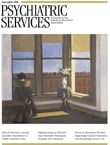Letter
Reflective and Reflexive Practitioners
To the Editor: I enjoyed the editorial and articles about qualitative research in the July 2008 issue. The tension between qualitative and quantitative methods is heightened because many clinicians and students, in my experience, lack awareness of qualitative methods in the social sciences, especially in psychiatry.
Although the coverage of this issue was illuminating, the Taking Issue editorial ( 1 ) makes reference to Schön's "reflexive practitioner," which I found confusing. Benner's "reflexive practitioner" ( 2 ) and Schön's "reflective practitioner" ( 3 ) are related concepts but are not exactly the same ( 4 ). The reflexive practitioner gains experience and, through active observation and reflection, is able to utilize "on-the-spot" experimentation to fulfill the role of "helping expert." This is to be contrasted with the "knee-jerk" reflex approach to health care, which, when dominant, contributes to a one-size-fits-no-one approach ( 5 ).
I believe that coexistence of these methodologies and broader awareness of them will be a critical factor in leveraging the enormous technological advances in modern health care so that all patients benefit from them.
1. Hopper K: Qualitative and quantitative research: two cultures. Psychiatric Services 59:711, 2008Google Scholar
2. Benner P: From Novice to Expert. Menlo Park, Calif, Addison-Wesley, 1984Google Scholar
3. Schön DA: The Reflective Practitioner. London, Temple Smith, 1983Google Scholar
4. Rolf G: Beyond expertise: theory, practice and the reflexive practitioner. Journal of Clinical Nursing 6:93–97, 1997Google Scholar
5. McEvoy V: Identical care is not best for all patients. Boston Globe, July 14, 2008Google Scholar



